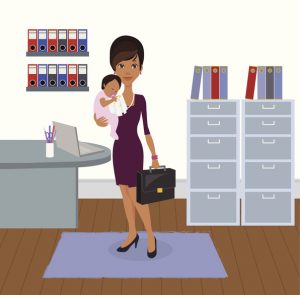
Ed. note: This is the latest installment in a series of posts on motherhood in the legal profession, in partnership with our friends at MothersEsquire. Welcome to Jamie Szal back to our pages. Click here if you’d like to donate to MothersEsquire.
“The course was not approved for H&D credit but was approved for ethics and general credits as posted. H&D courses generally need to be primarily focused on issues of harassment & discrimination among lawyers.”

Transform Legal Reasoning Into Business-Ready Results With General AI
Protégé™ General AI is fundamentally changing how legal professionals use AI in their everyday practice.
The courses in question were two CLE-approved seminars on discrimination against women in the courtroom as well as a program offered by ABA past-President Paulette Brown addressing COVID trends that had an adverse impact on and bias against law moms, offered as part of MothersEsquire’s inaugural in-person conference. The first program specifically addressed what bias against women and mothers in the courtroom looked like, with particular focus on jury bias, and how to combat it. The second program addressed the efforts of the ABA to study and identify caregiver bias and harassment in the legal profession and the steps being taken to combat it.
The H&D requirement in question is Maine’s relatively new requirement that all Maine-licensed attorneys take at least one hour of live programming addressing harassment and discrimination in the legal profession. According to the Maine Bar Association website, the credit “must be primarily concerned with the recognition and avoidance of harassment and discriminatory communication and conduct.” In the first year that the requirement was enforced, every licensed attorney in Maine was required to attend the exact same seminar at which they were asked to consider hypothetical scenarios that presented risk of bias, harassment, or discrimination.
One of those hypotheticals involved a law mom, newly returned to work from leave and scheduled for a trial, working to make arrangements to support her breastfeeding schedule. The conversation touched on whether a refusal by the judge to honor prearranged breaks during the trial was discrimination (it is), whether comments by opposing counsel on the new mom’s physique constituted harassment (it absolutely does), and other points. I was buoyed by the choice of the bar overseers to include this hypothetical as part of the very first H&D training. I felt seen. With that history, I assumed that my MothersEsquire programming was a shoo-in for approval.
I hope you’re having the same reaction I did to receiving the email that my request to have the MothersEsquire program approved for H&D credit denied. Namely, “What the heck?! How is training for lawyers about how to deal with juror bias or caregiver bias not programming that is focused on issues of harassment [or] discrimination among lawyers?!”

Humans in the Loop: The People Powering Trusted Legal AI
As the use of artificial intelligence permeates legal practice, a critical question confronts every legal professional who uses these tools: Can I trust this?
Harassment & Discrimination CLE requirements are a relatively new — but hopefully growing — trend as the legal industry turns its lens toward improving the practice for those of us privileged enough to call ourselves lawyers. To date, states joining Maine with this requirement include California, Colorado, Florida, Illinois, Iowa, Minnesota, Missouri, New Jersey, New York, Oregon, Vermont, Washington, and West Virginia. The purpose of these mandatory continuing education credits is to address systemic discrimination in the legal industry in a way that teaches lawyers how to identify the problems and provides possible solutions to do something about it.
The Maine Board of Board Overseers’ decision to deny approval for the H&D credit is itself a form of the very bias and discrimination the continuing education credit is intended to combat. More than that, it is a statement from the board that it does not think that there is a problem in the courtroom or in the profession for women at all. Bias and discrimination does not have to be an overt decision to deny someone an opportunity for which they are abundantly qualified — like a promotion to partner. It can be an insidious as refusing to acknowledge a problem exists.
Putting blinders on and refusing to recognize that issues like juror bias in the courtroom exist, or the national caregiver crisis impact is another form of discrimination. It represents an institutional refusal to recognize that victims of bias often have a better understanding of how to identify, overcome, and address the bias in the first instance. It is a sign that the experiences of people – often women, more often mothers – in these situations are not problematic for the industry. It is an institutional signal that the experiences do not constitute discrimination and that there is no need to address it in the profession. It signals to lawyers who are mothers trying to pursue professional ambitions while also parenting that they are less-than.
Less important than their male or childless colleagues because the problems they face are not important. One Harvard Business Review article hit the myth on the head: firms assume that because care-giving challenges are not talked about, they must not be an issue.
Less valuable than their male or childless colleagues because the problems they face do not need to be recognized.
Less significant to the industry as a whole because the problems they face do not need to be addressed for the industry to flourish.
Less.
Screw that.
 Jamie Szal assists businesses understand and strategically approach state and local tax compliance. Outside of work, Jamie is an active volunteer in her communities: serving on the Trinity College Board of Trustees and as a founding member of the college’s Women’s Leadership Council. She also is a member of the Board of MothersEsquire, involved with the Maine State Bar Association Women’s Law Section, and President of the board of Community Dental of Maine. She co-authored best-sellers “#Networked” and “Women in Law” about the power of women supporting women. Jamie enjoys chocolate, singing, and exploring Maine with her family.
Jamie Szal assists businesses understand and strategically approach state and local tax compliance. Outside of work, Jamie is an active volunteer in her communities: serving on the Trinity College Board of Trustees and as a founding member of the college’s Women’s Leadership Council. She also is a member of the Board of MothersEsquire, involved with the Maine State Bar Association Women’s Law Section, and President of the board of Community Dental of Maine. She co-authored best-sellers “#Networked” and “Women in Law” about the power of women supporting women. Jamie enjoys chocolate, singing, and exploring Maine with her family.